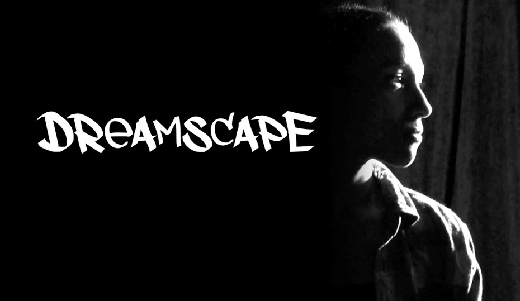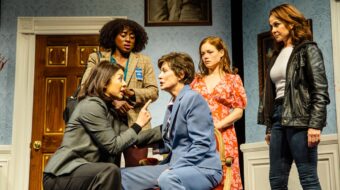
LOS ANGELES – Now more than ever, writer/director Rickerby Hinds’ Dreamscape is an urgent, ripped-from-the-headlines story about a police shooting of a young Black person. Except this liquidation didn’t recently happen: The play is inspired by the 1998 shooting in Riverside, Calif., of 19-year-old Tyisha Miller (here called “Myeisha Mills” and depicted by Rhaechyl Walker, who also plays multiple parts). Two actors perform in this one-acter. According to its version of events, after Myeisha falls asleep in a locked car parked at a gas station and doesn’t wake up when called, her cousin dials 911 for help. When a policeman arrives (played by African American actor John “Faahz” Merchant) he notices a pistol on the unresponsive Myeisha’s lap and opens fire. Dreamscape‘s Jungian title refers to Myeisha’s interior life, especially as to what she is thinking, feeling, dreaming as 12 shots fired by the cop strike her, four times in her head, five times in her back.
All this is very creatively expressed by the playwright, actors, choreographer Carrie Mikuls and taped music. Hip-hop is incorporated into the mix, along with Walker’s scintillating dancing and Merchant’s ear-blowing beatboxing. Walker doesn’t just walk, she flies, like an In Living Color Fly Girl, while Merchant’s superb sound effects and verbal pyrotechnics are in the same league as Michael Winslow of the Police Academy film franchise. (In addition to playing the killer cop, the multi-talented Merchant also plays an MC and white lab coat-garbed coroner.)
Honduras-born Hinds, who relocated to South L.A. when he was 13, has concocted the ingredients of a hard hitting drama, with trenchant subject matter imaginatively rendered. Bearing in mind that Hinds did not set out to create a doc-drama and freely used poetic license, his interpretation of the fictionalized murder of Myeisha raised a number of questions for this reviewer.
First of all, according to a Jan. 9, 1999 New York Times article, what really happened that fateful night of Dec. 28, 1998 was disputed, and a number of unanswered questions linger. Why did Tyisha have a gun and how did she get it? Did she point it at the police? Why was she unconscious and reportedly foaming at the mouth? And so on.
What is, however, indisputably factual is that there were four policemen at the scene and apparently all of them opened fire on Tyisha. Three of them were Caucasian; one was Latino. By casting a Black actor to portray the lone assassin (and Merchant is much darker than Walker), Hinds de-racializes excessive use of force by police just when we are witnessing an epidemic of white or part-white officers and vigilantes shooting and otherwise killing Blacks for little or no “cause.” Race – indeed racism – is a central part of this reign of terror against African Americans, and the casting of a Black actor (as admittedly great as Merchant undoubtedly is) deflects from this most salient of facts. It’s white police and self-appointed executioners responsible for this murderous trend; it is most definitely not a case of “Black-on-Black violence.”
Without knowing the specific facts of the Freddie Gray slaying while in police custody in Baltimore, one could make a strong case that the 25-year-old’s running from officers was not an example of suspicious behavior (not to mention not necessarily illegal). Even if one is as innocent and pure as the driven snow, fleeing from the police is an extremely reasonable thing to do: They are armed, dangerous and licensed to kill. Indeed, one doesn’t need to possess Sherlock Holmes’ powers of deductive reasoning to logically figure out that armed white police are not there to serve and protect, but rather a grave threat to one’s personal safety and health.
The liquidation of Gray, Michael Brown, Eric Garner, Tyisha and a long list of other lynch victims proves that America’s “law enforcement” agents have at the very least extraordinarily poor judgment and training, combined, in all probability, with a callous disregard for Black life. The recent statement by a leader of the Baltimore police union that demonstrators were a “lynch mob” is a classic case of Freudian projection: He is calling those protesting what appears to be an actual lynching what his group seems to actually be. Let’s remember in American history who lynched who.
While we’re on the subject of police brutality, a word about Eric Holder’s departure. Shortly after becoming America’s first Black U.S. Attorney General he was faced with whether or not the Justice Department would vigorously pursue and prosecute the police liquidation of handcuffed, unarmed Oscar Grant. By declining to do so, Holder opened the proverbial gates to Hell, announcing loud and clear to racist American police departments that it was open season on Blacks. Don’t worry, under Uncle Eric the Justice Department’s long arm of the law won’t reach police butchers – or, for that matter, the Bush regime’s war criminals or Wall Street banksters, none of whom were criminally charged for their atrocities.
Instead, Holder threw the book at minor offenders, as well as dissidents such as Internet activist Aaron Swartz [driven to suicide], and imprisoned whistleblowers Private Chelsea Manning and John Kiriakou [but unlike them, under Holder’s two-tiered double standard of “justice,” Gen. Petraeus won’t serve a day behind bars for leaking classified information to his biographer/mistress]. Late in his tenure, after the epidemic of police brutality reached tidal wave proportions, Holder finally took some action. But it was too late and too little – had he done so when the matter of Oscar Grant’s murder was before him, maybe Eric Harris – another Black man shot to death by a uniformed white officer who “mistook” his pistol for his taser – would be alive today. Who knows?
The overall level of artistry of the entire Dreamscape production may actually distract attention from the destructiveness of the current uncivil war being waged against Blacks. I’m usually one to applaud aesthetic innovations and imagination both onstage and onscreen. But Dreamscape‘s cinematic techniques, special sound effects, busting of dance moves and the like, as the play moves in and out of what the playwright imagines to be Tyisha/Myeisha’s state of mind while she is repeatedly struck by bullets, arguably prettifies the horrendous and softens the blows. The form of Italian Neo-Realism and British “kitchen sink” drama may be better suited for this harrowing subject.
Another question Dreamscape raises is Walker’s interpretation of Myeisha’s voice. During a talkback following a preview of the play, the light-skinned Walker confessed that because of her coloring and the texture of her hair she was told she “was not Black… [which] pushed me away from Black culture.” Although Walker does not speak with what, for lack of a better term to express in print, will be imperfectly described as a so-called “ghetto accent” (nor do the offstage Hinds and Merchant), Walker’s character does speak this way. So is an actress who was distanced from her roots falling back on racial caricatures to concoct her Black character? Is Tyisha’s onstage voice (i.e., not Hinds’ dialogue, but rather Walker’s accent per se while acting) authentic or is it stereotypical? I’m not sure I am qualified to answer this question, but Walker’s vocal patterns while playing her part sure had me scratching my head.
Nevertheless, having ranted and raved and said all this, there’s no escaping the fact that Dreamscape is well worth seeing, by anyone interested in this topic and/or who simply enjoys great dancing, boxbeating and more. It’s an important, if imperfect, work of art dealing with the current plague of police killings of Blacks. Like Ferguson, a controversial recent stage reenactment of the Michael Brown brouhaha at Los Angeles’ Odyssey Theatre in late April, along with protesters in the streets, artists in all media need to tackle the swinish scourge of gun-toting, trigger-happy cops with badges.
Dreamscape is being performed Thursday to Saturday at 8:00 pm; and on Sunday at 3:00 pm, through May 17 in The Gallery of the Los Angeles Theatre Centre, 514 S. Spring St., Los Angeles. For more info: (866) 811-4111; www.thelatc.org.
Photo: http://thelatc.org/

MOST POPULAR TODAY


Communist Karol Cariola elected president of Chile’s legislature

Zionist organizations leading campaign to stop ceasefire resolutions in D.C. area

Afghanistan’s socialist years: The promising future killed off by U.S. imperialism

‘Pender Denton—Outlaw’: An affecting, understated Old West gay love story






Comments